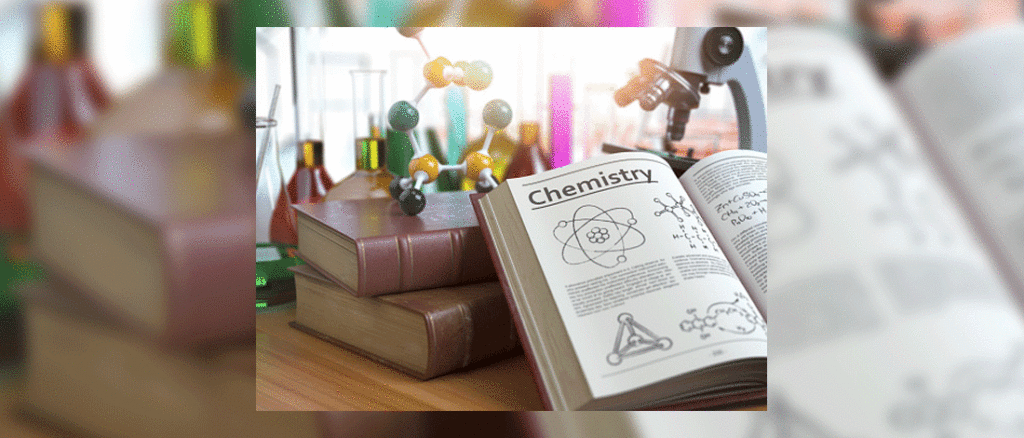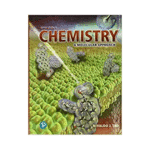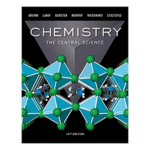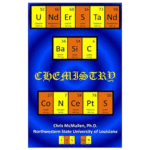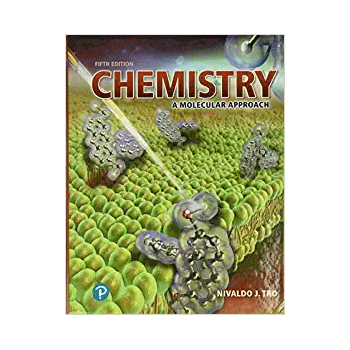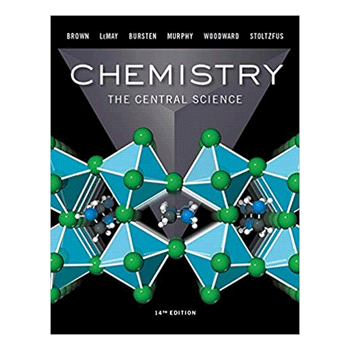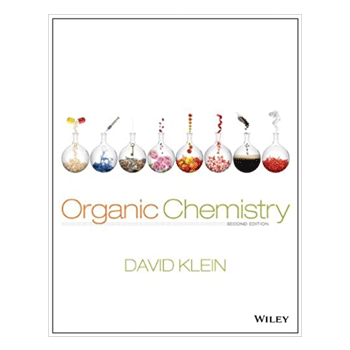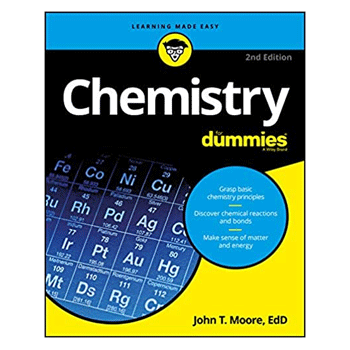It can be unnerving to learn Chemistry, and the vast concepts make it difficult to study without a supplemental resource.
If you are a professor or someone taking up a Chemistry course, make sure to check our list of the best Chemistry textbooks to help you learn (or teach) this complicated subject easily.
- Easy to navigate through
- Integration of real-world examples
- Contains relevant information needed for general Chemistry
- Practice problems to train students
- Provides the best Chemistry textbook visual aids
- Explains core concepts clearly
- Students can benefit from the self-paced tutorials
- Includes practice exercises
- Lessons have daily practical applications
- More succinct illustrations than most textbooks
- Teaches fundamental concepts of basic Chemistry clearly
- Practice exercises are conceptual
- Perfect for self-study
- Multiple exercises that use basic operations
- It contains questions and solutions to answers
Contents
Top 5 Textbooks for Chemistry
1. Chemistry: A Molecular Approach
Author: Nivaldo J. Tro
Why We Chose It: This molecular approach textbook on Chemistry has a very logical organization and explanation that fit every students’ thought processes.
Chemistry: A Molecular Approach also begins with basic concepts that increase in difficulty down the line, which makes it a good book, even for starters.
Unique Features:
- There are practice questions involving molecular nature that can help many students hone their problem-solving skills.
- The book contains multi-level images to help students understand lessons better.
- For chemical engineers who are avid Chem geeks, the Chemistry: A Molecular Approach shares a similar explanation style with Silberberg’s Chemistry: The Molecular Nature of Matter and Change.
- Easy to navigate through
- Integration of real-world examples
- Contains relevant information needed for general Chemistry
- Practice problems to train students
- Provides the best Chemistry textbook visual aids
- Some lessons are underemphasized
- Some chapters lack in-depth explanations
2. Chemistry: The Central Science
Author: Theodore L. Brown, H. Eugene LeMay Jr., Bruce E. Bursten, Catherine J. Murphy, Patrick M. Woodward, Matthew W. Stoltzfus
Why We Chose It: If you are a student or a professor on a budget, then Chemistry: The Central Science is the best general Chemistry textbook for you!
There have been 14 editions of Central Science up to date, and this alone speaks of how helpful this resource can be in understanding the essential concepts.
Unique Features:
- This General Chemistry textbook boasts of its clear explanation of core concepts.
- One copy of Chemistry: The Central Science can get you through two one-semester courses in general Chemistry.
- For those on a strict budget: there is an electronic copy of Chemistry: The Central Science for around 6% of the original price of the print version.
- Explains core concepts clearly
- Students can benefit from the self-paced tutorials
- Includes practice exercises
- Lessons have daily practical applications
- More succinct illustrations than most textbooks
- Some parts are reportedly dry
- Some lessons are not thoroughly explained
3. Understand Basic Chemistry Concepts: The Periodic Table, Chemical Bonds, Naming Compounds, & More
Author: Chris McMullen
Why We Chose It: This book has it all – from mapping through the periodic table to a better understanding of the atomic structure and concept tutorials. Aside from that, this is also a great introductory course for students who have no solid Chemistry background.
Unique Features:
- This is also one of the best Chemistry textbook references for advanced learners.
- The questions within the book are formulated through simple arithmetic, and the problem-solving parts are more conceptual than Mathematical, so students understand better.
- Teaches fundamental concepts of basic Chemistry clearly
- Practice exercises are conceptual
- Perfect for self-study
- Multiple exercises that use basic operations
- It contains questions and solutions to answers
- Major formatting issues needed on the cover
- Paperback versions come in black and white
4. Organic Chemistry, 2nd Edition – Standalone Book
Author: Dr. David Klein
Why We Chose It: This organic Chemistry textbook makes various concepts in Organic Chemistry easier to study and understand when compared with other books in the market today.
Unique Features:
- Organic Chemistry by David Klein offers a unique approach to tackling the subject by opting for a skills-based manner so students can understand the topics better.
- Organic Chemistry explains specific concepts in-depth and with equal weight on comprehensive problems.
- Provides thorough examples
- Uses essential elements and diagrams
- Uses skills-based approach in teaching challenging topics
- The book covers all essential topics
- Problem-solving concepts for better learning
- Some problems do not have solutions
- Some rental books are in bad shape
5. Introductory Chemistry Essentials (Mastering Chemistry)
Author: Nivaldo J. Tro
Why We Chose It: This is easily one of the best Chemistry textbooks for high school as it discusses the central science in fine detail. This publication from Tro is more of an introduction to general Chemistry, which makes it helpful even for those tackling advanced levels but have no strong foundation in Chemistry.
Unique Features:
- Nivaldo J. Tro, the same person who wrote Chemistry: A Molecular Approach, is the author of this book which gives the target market an idea of the quality that Introductory Chemistry Essentials bring to the table.
- As the name suggests, Introductory Chemistry Essentials focuses on the essential concepts that might arise in AP Chemistry.
- Offers new questions, data, and examples
- Includes new conceptual checkpoints
- Embedded visual texts, unlike other Chemistry textbooks
- Embedded visual texts, unlike other Chemistry textbooks Good introductory book to general Chemistry
- Present real-life examples
- A high school Chemistry textbook not suited for higher levels
- Quite pricey compared to other Chemistry books
Our Runners-Up
1. Chemistry for Dummies
Author: John T. Moore
Why We Chose It: Chemistry for Dummies is a good option for those with little to no idea of Chemistry at all. This is an introduction to general organic Chemistry since it is a for dummies edition, and it presents general, organic, and biological concepts in a non-intimidating approach.
Unique Features:
- The examples in Chemistry for Dummies are derived from real-world scenarios so learners can grasp the lessons easier, almost the same as how Chemistry: The Central Science presented the topics.
- Since no prior knowledge is assumed, Chemistry for Dummies created an approach that can help learn the periodic table and quantum theory and teach a student how to solve problems more easily.
- Makes the periodic table less overwhelming
- Includes Thermochemistry and chemical reactions
- Easy-to-follow lessons
- Packs actionable tips from Chem professors themselves
- Lessons have modern real-world applications
- Data interpretation is fit for no-background students on general Chemistry
- Chemistry for Dummies is too basic for College students
2. Chemistry: An Introduction to General, Organic, and Biological Chemistry, Global Edition
Author: Robert J. Ouellette
Why We Chose It: Chemistry: An Introduction to General, Organic, and Biological Chemistry, Global Edition contains almost the same organic and biological Chemistry lessons that other Chemistry books do. It also provides real-life examples which the students can easily understand and relate to.
Unique Features:
- This global edition comes in a friendly presentation style which is perfect for teaching general Chemistry to a non-familiar crowd.
- The approach to the lessons is very basic, which means those struggling in the subject can opt to study this book first before tackling more advanced ones.
- Provides relevant real-life examples
- Has practice exercises and activities
- Offers new tools to answer practice problems
- Clinically focused, perfect for forensic scientists
- Geared towards developing problem-solving skills
- Loose-leaf is not as durable and ideal
- Reports of some missing pages
Choosing the Right Chemistry Book

What is the author’s writing style?
When buying a Chemistry textbook, the tone and writing style must be formal, academic, and factual. The content should be composed of evidence-based information with sound arguments to prove their points.
We recommend choosing a book that suits the level of complexity you prefer. In general, the writing style of textbooks must be expository to explain complicated concepts better and descriptive to describe abstract ideas clearly to the readers [1].
What’s Your Learning Level?
Your learning level is an important indicator to determine the Chemistry books that fit the bill. If you are a high school student, Chemistry and Biochemistry books that present simple problems, simple explanations, and colorful visuals are better options.
While those on the college level may reap more benefits from Chemistry resources that are quite complex. This is called leveled reading, wherein the difficulty of the subject must be appropriated between emergent and advanced readers [2].
Purpose: Textbook or Supplement?
Whether your Chem book would serve as your primary textbook or supplementary material should also be brought to the table. A textbook typically should cover all information necessary in your field so you can make the most out of it.
Meanwhile, supplementary materials like Organic Chem model kits simply accompany or accentuate whatever information is delivered in class or your provided syllabus.
Also Read:
How About the Book Quality?
The quality encompasses the physical integrity and the contents of your Chemistry book. Ideally, your Chemistry material should be paperback or hardbound to assure the peak shape of your purchase, contrary to loose-leaf ones.
In terms of content, the organization of the topics must be logical. The purpose of Chemistry resources is to provide learning support, especially in a complicated subject like Chemistry. The quality of the problems and the solutions should be significant and in-depth for the readers to understand the topics.

Are There Sample Exercises?
Sample exercises are aspects that must never be taken away from Chemistry textbooks. These are the auxiliary information that complements the lessons embedded in the material.
Sample problems are essential to provide higher-order thinking abilities like discussing complex concepts like pH scale and atoms. These included exercises are tools to hone the learner’s problem-solving capacity. They also transform abstract Chemistry concepts into easily digested information.
Includes Comprehensible Explanations?
Sample problems in Chemistry are not necessarily easy to understand. It requires a certain level of commitment to learning the subject. Without having comprehensible explanations for the concepts and problems provided, it leaves a shallow understanding on the part of the learner. Explanation and visualization are always needed.
Are you an Instructor or Student?
Whether you are an instructor or a student may affect the criteria for which textbook you should select. Instructors might be inclined to buy Chemistry textbooks that are short, concise, and brief over the concepts (because it is presumed that they’re already familiar with the topics).
Meanwhile, students might need an in-depth manual covering all essential topics and their modern applications because they may not know Chemistry beforehand.
What’s the Price?
The price of the Chemistry manual will always come into play because not everyone has the means for an expensive resource. Since, more often than not, the level of information embedded is highly affected by the price, some readers might compromise the content with what their budget can afford.
Thankfully, the listing here provides some of the low-cost solutions for a Chemistry textbook. You can refer to the list we provided above to see which offers the best bang for your buck!
And Our Choice for the Best Chemistry Textbook is…
Each Chemistry textbook in this list has been carefully selected to provide the best value for readers searching for a Chemistry manual. Among the list, Chemistry: A Molecular Approach stands out as the best Chemistry textbook you can get on the market today.
It has great visual aids that help students understand the topics better and have a very organized flow of chapters. Aside from that, this book provides in-depth problems accompanied with answers and solutions and can be purchased at a relatively low price.
- Logical organization of all chapters
- Excellent visual aids
- Practice problems with solutions
- Relatively low-cost
- Easy to navigate through
Thank you for reading this far! I hope that the information provided in this article will be helpful to you.
- 8 Best Books On Evolution (2023 Updated) - May 16, 2022
- How Could Natural Selection Lead To Evolution? (2023) - May 16, 2022
- How Do Fossils Provide Evidence For Evolution? (2023) - May 16, 2022

